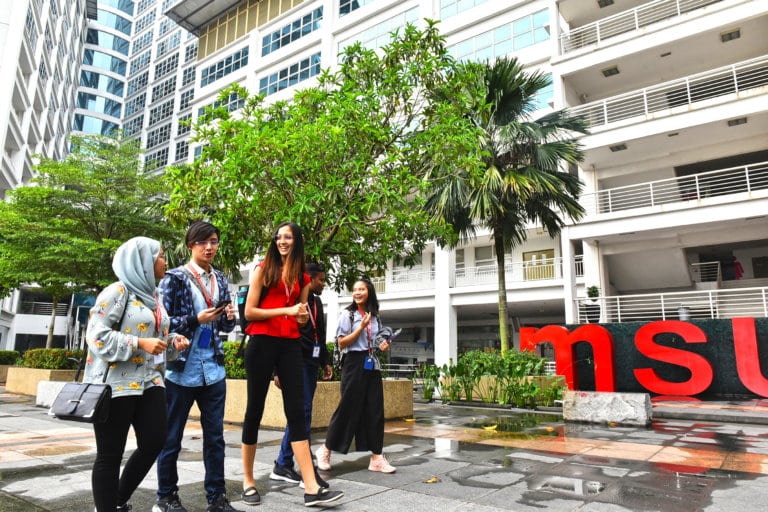
As today’s fastest-growing fields, computing and informatics hold the potential to unlock not just a fulfilling career, but the very future of mankind. In Asia, the region has made its mark as a global technological leader over the last decade. According to new McKinsey Global Institute (MGI) research, the region has accounted for 52% of global growth in tech-company revenues.
Not only are Asian universities strategically located where technological progress reigns, but they are also actively producing high-impact research that contributes to both local and global communities. This makes it a fertile ground for anyone seeking to master the essential skills and gain the practical experiences needed to launch a career in computing and informatics.
Here are three universities in Asia with leading computing departments and programmes.
Management and Science University

Management and Science University offers a wide range of courses from pre-university to postgraduate.
Source: Management and Science University
Management and Science University (MSU) in Malaysia is a place where students evolve into balanced, holistic and well-rounded graduates. Whether they are pursuing a foundation, diploma, bachelor or postgraduate programme, all students here can expect to thrive academically while sharpening their communications skills, entrepreneurial mindset and analytical, critical, and creative thinking.
Its Faculty of Information Sciences and Engineering (FISE) is home to three departments: Media Science & Graphic, Engineering and Technology, and Information Sciences and Computing. They offer close to 40 programmes that fuse knowledge of new technological marvels with diverse human values and global perspectives. These include the Bachelor in Computer Science (Honours), Bachelor in Business Computing (Honours) and Bachelor in Computer Engineering (Honours).
Other programmes that blend core knowledge with technical and soft skills just as well include the Bachelor of Medicine and Bachelor of Surgery (MBBS), Bachelor in Fashion Design with Marketing (Honours), Bachelor in Hospitality and Tourism Management (Hons), Bachelor in Computer Forensic (Honours), Bachelor in Psychology (Honours), Bachelor of Engineering Technology (Electrical and Electronic) (Honours), Master in Management, and Master in Educational Management and Leadership.
What’s more, as a Global TVET (Technical and Vocational Education and Training) Model University, it is passionate about teaching quality and motivation for learning, employability, research, internationalisation, learning environment and cultural and social enhancement. This focus and commitment have led to great results — over 95% employability rate (for students within six months of graduation) and strong connections with over 2,000 industries (local and international).
In the QS World University Rankings by Subject 2023, the university was ranked Top 50, Top 150, and Top 350. It is also the first accredited Entrepreneurial University in Asia and awarded the ABEST21 accreditation for the Faculty of Business Management and Professional Studies.
Hong Kong Baptist University

Hong Kong Baptist University offers programmes at several levels, from undergraduate to associate degrees and higher diplomas. Source: Hong Kong Baptist University/Facebook
Hong Kong Baptist University (HKBU) welcomes over 400 international students to its doors for various reasons. Not only does the university offer undergraduate degree, associate degrees and higher diplomas, but they also provide limitless learning opportunities that cultivate the best student experience and encourage cross-border collaboration. Some of these include Service Learning and global initiatives such as the Shared Campus programme which promotes internationalisation between partner universities including University of the Arts London and Zurich University of the Arts.
The Department of Computer Science offers two degrees – BSc (Hons) in Computer Science and BSc (Hons) in Business Computing and Data Analytics. The BSc in Computer Science offers four specialisations, namely Computing and Software Technologies, Information Systems and Analytics, Artificial Intelligence and Data and Media Communication. The BSc in Business Computing and Data Analytics is unique in the sense that it is an interdisciplinary programme jointly offered by the Department of Computer Science and School of Business.
Research lies at the heart of the university. Projects such as Persuasive Health Communication and a medicine-based therapeutic strategy for Rheumatoid Arthritis (RA) – realise the university’s vision and mission of delivering cutting-edge discoveries that contribute to society.
State-of-the-art facilities further encourage high-impact research that tackle global challenges. HKBU is home to six unique interdisciplinary laboratories that champion collaborative research across disciplines and faculties. These include the Augmented Creativity Lab, the Computational Medicine Lab, and the Ethical and Theoretical Lab AI.
Singapore Management University

A majority of postgraduate students come from abroad, representing 51 countries.
Source: Singapore Management University/Facebook
Singapore Management University (SMU) is home to over 12,000 students pursuing undergraduate, postgraduate professional and postgraduate research programmes at eight schools: College of Integrative Studies, College of Graduate Research Studies, School of Accountancy, Lee Kong Chian School of Business, School of Economics, School of Computing and Information Systems, Yong Pung How School of Law, and School of Social Sciences.
Aspiring Bill Gates and Larry Pages can choose from four undergraduate programmes and six postgraduate programmes. All programmes aim to tackle the world’s top technological concerns, in line with SMU’s key research area of Digital Transformation. The integrated research areas in the computer science programmes include Computing Practice and Education, Urban Systems and Operations, Active Citizenry and Communities as well as Safety and Security.
Research carried out here is high-impact. In April 2021, the School of Computer and Information Systems won two grants for both their projects: Smart Barrier-Free Access (SMARTBFA) v2 and Supply Chain Risk Resiliency Project for Supply Assurance/Procurement and Logistics.
Studying at SMU means learning in an international environment that’s dynamic and vibrant. International students hail from all corners of the world, including India, China, ASEAN countries, Europe, North America, Africa, the Middle East, Maldives, Japan and South Korea. In fact, 62% of postgraduate students are from abroad, representing 51 countries as of September 2022.
On top of that, students will greatly benefit from SMU’s partnerships with over 300 universities spanning 50 countries for exchange programmes, giving students a multitude of opportunities to gain global exposure.
*Some of the institutions featured in this article are commercial partners of Study International










